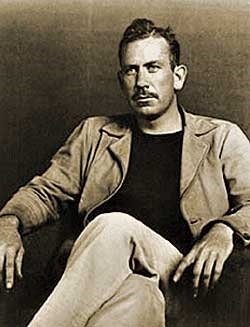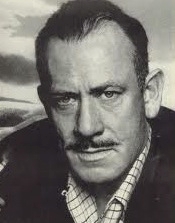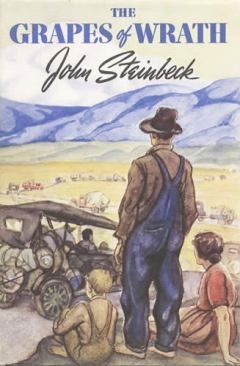 |
| (http://projectsmrj.pbworks.com/w/page/45538275/John%20Steinbeck ()) |
"Born just after the closing of the frontier, Steinbeck grew up with a frustrated modern America and witnessed the most notable failure of the American Dream in the Depression. He was a writer who inherited the great tradition of the American Renaissance". This quote is from a bibliography page and it shows that Steinbeck wanted to influence the world literary and historically. He was born into a middle class family on February 27, 1902. He grew up to be an artist. Steinbeck grew up during the Great Depression, and he reshaped the American renaissance. Steinbeck graduated in Salinas High School in 1919. After that, he enrolled in Stanford University. Unfortunately, he had academic difficulties and dropped out of college a couple times so he could work on ranches and so he could observe real life. In 1935 Steinbeck's book Tortilla Flat was a success and made him popular. Steinbeck spent most of his time in Monterey County, California, where he set the setting of his fiction there. He also wanted to be open minded with ideas for his novels. With his ambition, Steinbeck finished his book, Grapes of Wrath in 1939. His book was known for giving a bitter view on the great depression decade and he also won the noble prize of literature in 1962. With Steinbeck's determination he made sure his script Tortilla Flat would get published and it was thanks to Pascal Covici. John Steinbeck was open minded and wanted to bring new ideas in his novels. Steinbeck was ambitious in completing his novels. With his determination, he wanted to write novels to help show how the war was and how people felt during the Depression.
John Steinbeck was open minded because he worked on ranches and used new ideas for his novels and journalistic pages. Steinbeck attended a university for a while but then left it so he could work on ranches and study migrant workers. "From 1919 to 1925, Steinbeck worked closely with migrants and bindle stiffs on California ranches. Those relationships, coupled with an early sympathy for the weak and defenseless, deepened his empathy for workers, an empathy that is characteristic in his work." He was open minded and wanted to write books about the Great Depression and he wanted to show how hard it was for America during this time. Steinbeck learned that America was going through a rough time and he learned that the American dream was not an easy thing to achieve. Steinbeck started to write his first novel cup of gold. "It took him the early years of the decade to test his stride, to polish his style, and to chart his fictional terrain. The prose in his first novel--the tale of Henry Morgan, pirate--is lush; the artist who loved words strikes exotic chords and burdens sentences with modifiers". He was open minded about writing his first fiction novel cup of gold and he wanted to complete polishing it up. His first novel Cup of Gold was about a pirate named Henry Morgan. His book did succeed as he intended it to but he was open minded to new ideas which brought him to write Grapes of Wrath. Steinbeck was open minded which brought him to experience new things.
 |
| (http://demolaypa.blogspot.com/2012/04/senior-demolay-highlight-john-steinbeck.html ()) |
Steinbeck built an ambition that drove him to accomplish his novels. Even if the critics did not like his books, Steinbeck would still have the ambition to keep writing his novels. Steinbeck traveled with his third wife Elaine in 1950-1960 during this time he wrote East of Eden. "Like The Grapes of Wrath, East of Eden is a defining point in his career. Some claim that even East of Eden, his most ambitious post-Grapes novel, cannot stand shoulder to shoulder with his searing social novels of the 1930s. Steinbeck never ceased to take risks, to stretch his conception of the novel's structure, to experiment with the sound and form of language". Steinbeck did not want to stop writing novels because he has built this ambition that has made him try new things so that his novels may succeed. His novel East of Eden was not successful but Steinbeck never stopped writing novels and his ambition drove him to new concepts for his novels. Steinbeck lived in Salinas Valley during the Great Depression which was in the 1930s. "The Great Depression, plagued the United States during the 1930's, provided Steinbeck with the basis of what would become his greatest works. Steinbeck witnessed firsthand the hardships endured by migrant farm laborers, and became a sympathetic advocate of workers' rights". He was so ambitious that he wanted to write novels based off on how it was for people during the Great Depression. When Steinbeck lived in Salinas Valley he learned and witnessed the hardships for farm laborers. Steinbeck showed a lot of ambition and he wanted to accomplish new novels.
 |
| (http://entertainment.time.com/2005/10/16/all-time-100-novels/slide/the-grapes-of-wrath-1939-by-john-steinbeck/#the-grapes-of-wrath-1939-by-john-steinbeck ()) |
John Steinbeck showed a lot of determination and with his determination he wanted to help out in the war efforts and he also wanted to write another novel. Steinbeck wanted to participate in the war efforts and by doing so he wrote novels. "Steinbeck was determined to participate in the war effort, by writing (The Moon Is Down, 1942, and Bombs Away, 1942) and then going overseas for the New York Herald Tribune as a war correspondent." He was determined to help out in the war efforts but with patriotic work first. Steinbeck wrote two war novels; The Moon is Down and Bombs Away. Steinbeck explored different paths like filmmaker, biologist and journalist."His determination to shift directions was real enough. After writing The Grapes of Wrath, he declared that the novel was dead. He explored divergent paths: filmmaker, biologist, documentary historian (Bombs Away: The Story of a Bomber Team [1942]), and journalist. As war correspondent, he could make the commonplace intriguing and the uncommon riveting."(Shilling law). Steinbeck was determined to write another novel but this time he wanted it to be different so he explored different paths like film maker and biologist. He was determined to help out the war efforts so he was a war correspondent for New York Herald Tribune. Steinbeck had so much determination that he helped the war efforts by being a war correspondent and he wrote two new novels.
Steinbeck had much intention in being open minded because he worked on ranches and traveled around the world by doing this he could have many ideas for his novels. He was an ambitious person. He wanted to complete his novels no matter what. He had much determination in writing about World War 2 and the Great Depression. He wrote new novels and he worked hard during his life. He never gave up on writing his novels. Steinbeck understood what happened during the Great Depression and he showed us the difficulties during this time. He inspired us with his novels because his novels showed us new literary terms and his novels really characterized people during the Great Depression. He cared about America and he showed this by helping out in the war as a correspondent. Steinbeck was a great writer who used new literary terms and he was always open minded. He was remembered by being a great writer and he showed us the aspect of American life.
Works Consulted
Grossman, Lev. "All-TIME 100 Novels." TIME.com. 16 Oct. 2005. Web. 17 May 2012
Millichap, Joseph R., and Millichap Joseph R. "John Steinbeck." Critical Survey Of Long Fiction,
Fourth Edition (2010): 1. Biography Reference Center. Web. 7 May 2012.
Nyle. "John Steinbeck." Institutional Memory [licensed for Non-commercial Use Only] /. Web.
17 May 2012..
"PA DeMolay News and Views." : Senior DeMolay Highlight. Pa Demolay News and Views, 12 Apr. 2012. Web. 17 May 2012.
Ryan, James. "John Steinbeck." John Steinbeck (9781429802857) (2005): 1. Biography Reference Center. Web. 10 May 2012.
Shillinglaw, Susan. "John Steinbeck." American National Biography (2010): 1. BiographyReference Center. Web. 10 May 2012.
Shuman, R. Baird, and Shuman R. Baird. "John Steinbeck." Magill's Survey of American Literature, Revised Edition (2006): 1. Biography Reference Center. Web. 8 May 2012.
"Steinbeck Center." Steinbeck Center. Web. 09 May 2012.
"Steinbeck, John." Britannica Biographies (2011): 1. Biography Reference Center. Web. 8 May
2012.
Page created on 11/30/2013 4:49:50 PM
Last edited 1/6/2017 10:54:24 PM
